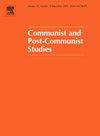Europe in Georgia’s Identity Discourse
IF 1.3
4区 社会学
Q3 INTERNATIONAL RELATIONS
Communist and Post-Communist Studies
Pub Date : 2021-06-01
DOI:10.1525/J.POSTCOMSTUD.2021.54.1-2.128
引用次数: 7
Abstract
Georgia’s European identity, often regarded as the basis of its pro-Western foreign policy, has been contested in the domestic arena by alternative agendas. While government changes are usually deemed instigators of change in this contestation, no systematic analysis has been conducted on the effect of external developments. Considering that Georgia’s relations with the West and Russia have been evolving and that the debates on European identity inherently relate to foreign policy, this article asks to what extent and how contestation within the European identity discourse changes in response to different external events. To elucidate these questions, the study unpacks European identity discourse in Georgia between 2012 and 2017 in the context of various ongoing foreign policy developments. These include developments in Georgia–European Union (EU) and Georgia–Russia relations, the war in Ukraine, and internal issues of the EU. Moreover, instead of common pro- and anti-European binary positions, identity discourse is analyzed as a combination of three identity categories via media in which each category constructs different degrees of difference with Europe. This article finds that advocates of each category interpret different foreign policy developments to reinforce, rather than challenge, their positions; thus, contestation and division in the discourse persist over time.格鲁吉亚身份话语中的欧洲
格鲁吉亚的欧洲身份通常被视为其亲西方外交政策的基础,但在国内却受到其他议程的质疑。虽然在这场争论中,政府的变化通常被认为是变化的始作俑者,但对外部发展的影响却没有进行系统的分析。考虑到格鲁吉亚与西方和俄罗斯的关系一直在演变,而关于欧洲身份的辩论本质上与外交政策有关,本文将探讨欧洲身份话语内部的争论在多大程度上以及如何因应不同的外部事件而发生变化。为了阐明这些问题,该研究在2012年至2017年期间,在各种正在进行的外交政策发展的背景下,解开了格鲁吉亚的欧洲身份话语。这些问题包括格鲁吉亚与欧盟、格鲁吉亚与俄罗斯关系的发展、乌克兰战争以及欧盟内部问题。此外,认同话语不是常见的亲欧和反欧二元立场,而是通过媒体作为三种认同类别的组合来分析,其中每个类别都构建了与欧洲不同程度的差异。本文发现,每种类型的支持者都将不同的外交政策发展解释为加强而不是挑战他们的立场;因此,争论和分歧在话语中持续存在。
本文章由计算机程序翻译,如有差异,请以英文原文为准。
求助全文
约1分钟内获得全文
求助全文
来源期刊

Communist and Post-Communist Studies
Multiple-
CiteScore
1.90
自引率
0.00%
发文量
23
期刊介绍:
Communist and Post-Communist Studies is an international journal covering all communist and post-communist states and communist movements, including both their domestic policies and their international relations. It is focused on the analysis of historical as well as current developments in the communist and post-communist world, including ideology, economy and society. It also aims to provide comparative foci on a given subject by inviting comments of a comparative character from scholars specializing in the same subject matter but in different countries.
 求助内容:
求助内容: 应助结果提醒方式:
应助结果提醒方式:


